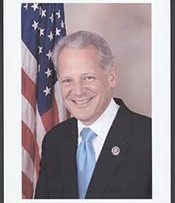Kamala Harris has a good chance of winning Pennsylvania without Shapiro
Pennsylvania’s 19 electoral votes are still in play for Vice President Kamala Harris after selecting Minnesota Gov. Tim Walz as her running mate instead of Pennsylvania Gov. Josh Shapiro, according to political analysts.
“Walz helps in every battleground state. He’s proven he knows how to win both progressive and conservative-leaning districts. That’s the path to the presidency, and he’s already demonstrated how to do well there,” former Rep. Steve Israel, a New York Democrat, who served from 2001-17, told Baltimore Post-Examiner.

Israel, who served four years as chair of the Democratic Congressional Campaign Committee (DCCC), said today vice-presidential candidates are often chosen for different reasons than they were in the past.
“The electorate is so trivialized right now that the old rules of geography and identity for a vice presidential selection aren’t as relevant. I mean, J.D. Vance didn’t exactly lock down Ohio for Trump, it was already leaning hard in his direction.”
Former Rep. Ron Klink, a Pennsylvania Democrat, who served from 1993-01, said that while Shapiro might have helped the ticket carry Pennsylvania, so might Walz.

“Shapiro being on the ticket would certainly have been a boost, but there were some potential negatives…”Walz is a very talented candidate. He is an accomplished legislator and governor and organized labor loves him. The unions will be supercharged with Tim on the ticket. He was their choice.”
Thomas Schaller, a professor of political science at the University of Maryland Baltimore County (UMBC), said without Shapiro on the ticket winning Pennsylvania might be a little bit more difficult for Democrats but it is still within reach.
“Shapiro is a home state governor. That is one downside risk of picking anybody but Shapiro. But Walz came from one of the most Republican-leading House districts when he served in Congress. And I think if the Harris campaign dispatches him to the so-called: ‘Alabama in Pennsylvania‘-that is found between Philadelphia and Pittsburgh-he will do pretty well there.”
Todd Eberly, a professor of political science at St. Mary’s College of Maryland, echoed similar sentiments.
Harris announced her selection on Tuesday after the conclusion of a two-week vetting period that was preceded by President Joe Biden’s announcement that he would not seek re-election. Biden immediately endorsed Harris.
Harris has since earned enough delegates to secure the Democratic nomination and has raised more than $300 million. Harris is polling nationally at or about even with the Republican candidate, former President Donald Trump.
Both Trump and Harris are targeting substantial resources toward winning Pennsylvania, which is the largest electoral prize of all seven critical battleground states, and is often won by a very slim margin.
Some polls show Trump with a small lead in Pennsylvania while others show Harris with a slight lead in the state.
No presidential candidate has won the White House without carrying Pennsylvania, Michigan, and Wisconsin since George W. Bush in 2004. Since that election, Democrats have carried all three states except 2016 when Trump won them.
Harris’ list of potential running mates included not only Shapiro, but also Sen. Mark Kelly of Arizona, Kentucky Gov. Andy Bashear, Illinois Gov. J.B. Pritzker, and Transportation Secretary Pete Buttigieg.
The final decision reportedly preceded a contentious debate between proponents of Shapiro and proponents of Walz. Moderate and independent Democrats wanted Shapiro while progressive Democrats favored Walz.
Many Democrats had raised concerns that the addition of Shapiro to the ticket might have alienated Arab-American voters in Michigan as well as young progressive pro-Palestinian activists who have become a significant force in the Democratic Party.
Shapiro is Jewish and is staunchly pro-Israel. Some conservatives accused him of having walked back some of his pro-Israel bonafides due to comments he made at a recent news conference.
Both Harris and Walz are widely viewed as more amicable to Gaza protestors than Shapiro or even Biden.
Harris’s husband, Douglas Emhoff, is Jewish and has tried to reassure Jewish Democrats that the vice president is undoubtedly pro-Israel.
During the vetting process, some Jewish Democrats had argued that the criticism of Shapiro was simply thinly veiled anti-semitism.
After news broke that Harris had selected Walz, many Republicans argued that Shapiro was not chosen solely because he is Jewish.
Even Democratic pundit and CNN contributor Van Jones raised concerns about anti-Semitism in the party after Harris passed on Shapiro.
Shapiro is the third person of the Jewish faith to serve as governor of Pennsylvania. He was elected in 2022 by double digits against a candidate who was accused of having dabbled in anti-Semitic conspiracy theories.
Shapiro won in areas of the state that are Republican strongholds. He has a 61% approval rating, making him one of the most popular governors in the country.
Some pundits thought Shapiro’s faith would be an asset on a national ticket. Others said it would be a detraction.
Shapiro would not have been the first Jewish person on a presidential ticket. In 2000, the late Connecticut Senator Joseph Lieberman was on the ticket when Al Gore ran for president.
But if Shapiro had been selected, and if the ticket won, he would have been the first Jewish vice-president.
So, was anti-Semitism and/or Shapiro’s support for Israel a factor in the selection process?
“The rejection of Josh Shapiro speaks volumes about Harris’ latent anti-Israeli views as well as her perceiving no need for some balance in her far-left Weltanschauung (worldview),” said Richard Vatz, a professor emeritus of political persuasion at Towson University. “The choice should make it easier for Harris psychologically, and she will get not a modicum of push-back on any positions she takes from Walz.”
Vatz went on to say Walz is far from being a centrist.
“He is a far-left progressive’s dream, likely to repel Independents, with favoring felons’ rights to vote, far-left positions on abortion, tougher gun-owning provisions, and soft-on-crime policies, known for his reluctance to enlist the Minnesota National guard when rioting struck after George Floyd’s death.”
Schaller disagreed, saying the verdict is still out on where Walz stands ideologically.
“If you listen to CNN, they are saying how Harris picked a more moderate-centrist-independent to balance her to the right. If you turn on FOX, they are saying Harris is the centrist and now she has gone far-left by picking Walz. I think there is some confusion because he is hard to place on a left-right spectrum. Because there is a melding of his biography and his geography and his background and his policies.”
Schaller said Harris likely passed on Shapiro because of concerns about his support of Israel and the arguably hard line he took against Gaza protestors, many of whom referred to the governor as “genocide Josh.”
“Given her (Harris’) chilly reception of Bibi Netanyahu when he was here a week ago: Harris wants to create a little bit of sunlight, a little bit of distance between herself and Biden on the Israel question and the war. I think picking Walz allows her to do that. Whatever downside risk there was in passing on Shapiro, there are many Muslim and Arab-American communities in Michigan that might have been more difficult for her to attract if she had picked Shapiro.”
Former Rep. Jason Altmire, a Pennsylvania Democrat, who served in Congress with Walz, agreed.

“It wouldn’t surprise me if the recent escalation in the Israeli conflict was the deciding factor playing against Gov. Shapiro. With the possibility that the issue will be a significant factor in the election as a wider conflict seems inevitable, the vice president probably wanted to avoid antagonizing a key faction of the Democratic party with a running mate with such a quantifiable pro-Israel history. I believe Gov. Shapiro would have also been an excellent choice, but that issue likely sunk his chances.”
What does it all mean?
Israel was not the only reason some progressives opposed adding Shapiro to the ticket.
The governor had previously declared his support for school vouchers, which is opposed by most Democrats and the teachers’ unions that raise large sums of money for the party.
Shapiro also was opposed by fellow Pennsylvanian Sen. John Fetterman.
The feud between the two Democrats, according to news reports, dates back to when Shapiro was state attorney general and Fetterman was lieutenant governor.
At the time, both men served on the Pennsylvania Board of Pardons, and Fetterman is said to have taken issue with Shapiro’s more hard-line approach to issues surrounding second chances for convicted felons.
Fetterman was in attendance on Tuesday evening at a Philadelphia rally where Shapiro enthusiastically declared his support for the Harris-Walz ticket at their first joint public appearance.
Shapiro told the audience that he was “proud” to be Jewish and proceeded to quote an ancient Jewish philosopher.
“My faith teaches me that no one, no one is required to complete the task, but neither are we free to refrain from it. That means that each of us has a responsibility to get off the sidelines, to get in the game, and to do our part.”

Bryan has a Bachelor’s Degree in Political Science and a life-long passion for politics at all levels. He has interned in the Maryland General Assembly and has volunteered for several congressional campaigns. Given this particular background, he has a unique insight into the dynamics of political analysis. When he is not writing, Bryan spends his time reading about history and frequenting Chinese restaurants.

